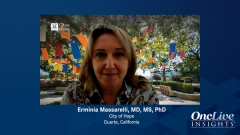
Other Agents Targeting EGFR Exon 20 Insertion Mutations in NSCLC
Experts briefly review a number of other agents in NSCLC that target EGFR exon 20 insertion mutations.
Episodes in this series

Transcript:
SEGMENT DESCRIPTION: Experts briefly review a number of other agents in NSCLC that target EGFR exon 20 insertion mutations.
Catherine Ann Shu, MD: Poziotinib was a drug studied for EGFR exon 20 insertion mutations around the same time mobocertinib and amivantamab were being studied. I think it’s a less exciting drug for EGFR exon 20 insertions. It’s probably going to be more exciting for patients with HER2 exon 20. The FDA has granted fast track designation to poziotinib for HER2 exon 20 in non–small cell lung cancer.
For the patients with EGFR exon 20 insertion mutations, the response rates were quite low. Poziotinib demonstrated response rates around 14.8%, and the rates of treatment-related grade 3 and above rash and diarrhea were also quite high at 28% and 26%. I think that poziotinib is probably going to be more for the HER2 patients.
Erminia Massarelli, MD, MS, PhD: Patients with exon 20 insertion are looking for ways to improve their treatment, and there are other options. One is a higher dose of osimertinib. It was previously tested and the results were presented at ASCO [American Society of Clinical Oncology annual meeting] in 2020. This was a cooperative group trial of 21 patients treated with a higher dose of osimertinib. The dose was double what we currently give to patients with EFGR sensitizing mutations at 160 mg vs 80 mg.
This dose was continued daily until intolerable toxicity or withdrawal. One line of therapy was required as eligibility criteria, and stable asymptomatic brain metastases were allowed. Six patients remained on treatment at the time of the analysis, which was generated in 2020. Among the 20 eligible patients, the best response was a partial response [PR] in 4 patients and 1 complete response. Therefore, the response rate was 25%. Twelve patients, or 60% of them, had stable disease. The median progression-free survival was 9.7 months, and the median duration of response was 5.7 months. It was very well tolerated. The only higher than grade 3 treatment-related adverse events [AEs] observed in patients were anemia, fatigue, and prolonged QT interval. So this is an option for patients who have exon 20 insertion mutations.
Other possibilities are in clinical trials. There is no other specific FDA-approved inhibitor. But I want to mention one trial. It’s the MARIPOSA trial, in which they are seeking to randomize 1000 patients to lazertinib, which is a new EGFR tyrosine kinase inhibitor, plus either amivantamab or placebo, versus osimertinib plus placebo. This is being studied as first-line therapy for patients with locally advanced or metastatic non–small cell lung cancer with EGFR exon 19 inhibition or 21 substitution.
There is also the possibility of having additional cohorts in the CHRYSALIS-2 trial. There were some cohorts looking at patients with exon 20 insertion and uncommon EGFR alterations such as S768 or L861Q and G719X. So I think the possibility of combining lazertinib and amivantamab also could be explored in EGFR exon 20 mutations.
Catherine Ann Shu, MD: The other exciting exon 20 insertion trial is CLN-081. Preliminary findings were presented at ASCO by [Zofia] Piotrowska, [MD,] and among 25 response-evaluable patients 10, or 40%, had a PR, and 14, or 56%, had stable disease. The AEs we saw were rash in about 49% and diarrhea in 24%. But again, these are known EGFR toxicities. This drug seems to have efficacy in both heavily pretreated patients and also in treatment-naive patients, so I think that’s an exciting trial to keep an eye on. I have patients who have progressed on amivantamab, and they’re like, “What’s next?” One patient has tried mobocertinib and amivantamab and had responses to both, but now is looking for something else. It’s good that we have new things coming out.
Transcript edited for clarity.








































